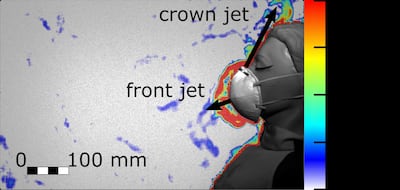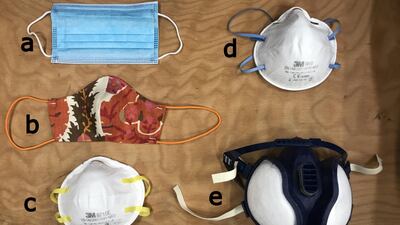Home-made masks or scarves can limit how far an exhaled breath can travel by 90 per cent or more, helping to slow the spread of coronavirus, a new study has found.
The air exhaled by people with Covid-19 can contain droplets of water, many of which may hold the virus.
Researchers at the University of Edinburgh in Scotland tested seven types of face masks, including handmade and surgical masks, respirators, and both lightweight and heavy-duty face shields.
Unless they contained a valve, all of the masks reduced the forward distance travelled by exhaled air by at least 90 per cent. Masks with valves allowed more breath to escape from the back and sides.
Imaging techniques were used to enable scientists to measure the distance and direction that a breath travels when someone coughs or breathes heavily.
Study participants wore the face coverings standing up and lying down, to see if positioning had an effect. Readings were also taken from a mannequin connected to a cough-simulating machine.
However the study also found limits to DIY masks – some potentially dangerous particles still escape into the air unless coverings are fitted properly and are of a medical standard.
Handmade and surgical masks allowed for "far-reaching leakage jets to the side, behind and above and below" with "intense backward jets" from coughing or heavy breathing.
Respirator masks, mainly used by workers exposed to fine dust, offered protection but the valves on the masks designed to aid breathing could potentially allow infectious air to spread considerably to the front.
Countries and health organisations are divided over the benefits of wearing face coverings, but the University of Edinburgh researchers hope the study offers governments guidance on Covid-19 containment policy.
Some countries, such as Germany and the Czech Republic, have made it compulsory in public places while the US Centres for Disease Control and Prevention (CDC) and the UK government, for example, have recommended face coverings in crowded places where it isn’t always possible to maintain social distancing.

In the UAE, Dh3,000 fines are given out to anyone who fails to wear a face mask in public. France has introduced €135 (Dh545) fines to those not wearing face coverings on metro lines or buses, while similar measures are in place in New York.
“I have generally been impressed by the effectiveness of all the face coverings we tested,” said Dr Ignazio Maria Viola, who co-ordinated the research.
“However, we discovered that some face coverings allow the emergence of downward or backward jets that people are not aware of and that could be a major hazard to others around them.”
Dr Felicity Mehendale, a surgeon at the Centre for Global Health at the university, said it was "reassuring to see the handmade mask worked just as well as the surgical mask to stop the wearer's breath flowing directly forwards".
But she warned the backward jets meant people needed to be careful when standing behind or beside someone wearing a mask.

